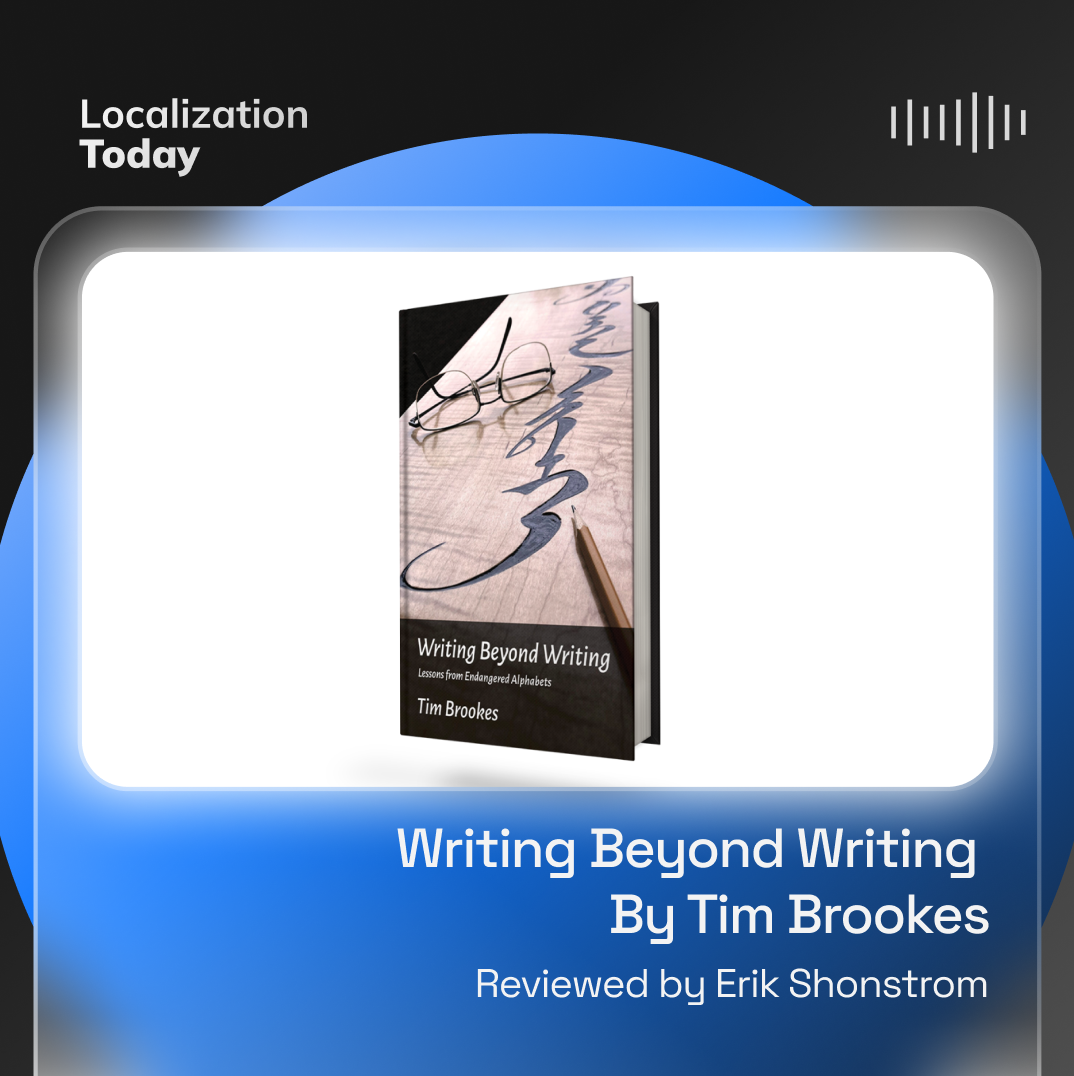Episode Transcript
[00:00:02] Speaker A: Welcome to Localization today. My name is Eddie Arrieta, CEO at Multilingual Magazine. We're having today a conversation with Walid Al Subi. He's the chairman of the board at SATA, the translation association here in Saudi Arabia. He's also the head of the translation department and project manager. He's also an assistant professor in the University of Jeddat.
Salaam alaikum usted.
Hello.
[00:00:35] Speaker B: Hello, Eddie.
Welcome to Riyadh again.
Welcome to the Translation Forum this year.
[00:00:42] Speaker A: I'm really happy to be here, really happy to be talking to you once again now on camera. I'm being recorded.
[00:00:50] Speaker B: Thank you.
[00:00:50] Speaker A: But we've had some really good conversations and I'm here to, like we said, pick your brain and understand a little bit more about Saudi and about what the future holds for Saudi. I hope you are ready for it.
[00:01:04] Speaker B: Yes, I'm ready. And I hope all the listeners who watch this podcast episode will know more about Saudi Arabia and translators in Saudi Arabia.
[00:01:16] Speaker A: Fantastic. And why do we get started by telling our audience who is Walid?
[00:01:23] Speaker B: Okay, I think it's not an easy. There is no an easy answer for this. Waleed is Saudi translator who wants the best for his colleagues in the translation field in Saudi Arabia and the region and of course, of the world.
I hold MA and PhD in Translation Studies.
I'm trying to move between the academics and the field, I mean the professional field of translation, because I think that the link should be always active between those, because both sides informs each other. So you need to work here and go apply this, the knowledge from academics into the professional field and same things goes the other way.
[00:02:20] Speaker A: Yeah, and that's really good because it positions you really well for our conversation today.
We know, and we've been hearing for a few years now, there is a vision for Saudi 2030.
What role does translation and translators play in that Vision 2030?
[00:02:40] Speaker B: First of all, we are really glad and happy and furniture and with a really good.
We're in luck actually to live in this era in Saudi Arabia. Me as a Saudi translator who is witnessing this progress, this vision, this really ambitious vision, Saudi Arabia, to be honest with you, it changed everything. All the sectors, including translation, now living and new standards.
Our standard now is the sky. Our limits is the sky. And actually, because the government, to be honest with you, try to push the boundaries more and more further and need us as young Saudi to go further and further.
And translation and translation in particular, we have the commission now, the Literature Publishing and Translation Commission, established recently.
And with its establishment, everything has Changed. Now we have a very specialized commission that care about translators.
Create more and more projects tailored for translators like tergem, which is a program that support translators and publishing house to translate more and more books from English and other language and any language into Arabic.
Also we have the certified translator program, which is like a test for.
You can go and do this test and then you have like to be a certified translator inside Saudi Arabia, which give you like more creditability among like who provide jobs so they'll be more trustable and to find more jobs suited for you.
And the other, there is another institution or entity that work together with the commission, which is the satas, the Saudi Arabian Translation Association.
Both worked hand in hand to provide better platforms, better atmosphere for the Saudi translator and any translator work in Saudi Arabia.
[00:05:11] Speaker A: Excellent. And why don't we dig a little bit deeper into SATA, the. The Saudi Arabian Translation Association. Congratulations. You are the chairman and board member of SATA.
Specifically, what are you hoping to achieve? What role do you expect SATA to play in the upcoming years? To reach the sky, like you said?
[00:05:32] Speaker B: Okay, one simple answer. To remove the boundaries between the Saudi translator and the world.
We want to transfer the Saudi translators to be a global translator. And by this I mean to make the Saudi translator the first choice for every and every company that wants translator to work in projects related to Saudi Arabia. If we think, if we go back to the point where I discussed The Saudi Vision, 2030, lots and lots of companies now entering Saudi Arabia to help in achieving and working on these mega projects in Saudi Arabia like the Line neom and also other sectors like in tourism and entertainment, for example.
So all these projects need Saudi translator to understand the content.
Okay? So at the same time they need not only not professional, we need professional translators to work with such big projects and companies. And this is our role here. To educate young translators to support professional translators in Saudi Arabia also and provide the training skills, educate them about the new technology.
And if you allow me to talk more about technology, because it's a really important topic. Actually we are really focusing on it in the association because like I said, we want to move the Saudi translate to be a global translator, to be trustable as a professional translator with the standards of all the global companies to do this, we believe first we need to educate the translators more about the technological solutions that all the big Companies use, like Cat Tools, AI LLMs now and to do a big.
To overcome a very big challenge, which is removing the fear of technology, of AI most of translation. Now they are afraid of to be replaced by AI. So I think one main thing to do or achieve, hopefully, I mean the situation to work on removing this by shedding the light on how technology is just a helper, not an enemy.
And for translators to be more professional, they need to benefit from this technology AI to move from regular translate to a professional one.
[00:08:42] Speaker A: Excellent. You of course have mentioned that technology is big. There should be a specific approach to technology.
What are you seeing in your colleagues in Saudi Arabia?
Is that fear that you're mentioning about, Is it prevalent also in the translators here? Or do you see a different approach in them? How do you see your colleagues in Saudi Arabia taking technology?
[00:09:05] Speaker B: Actually, I can categorize translator Saudi Arabia into two categories.
There is one category that who are more into technology.
And like the idea of using technology and AI to improve their translation. And also to work in CAT tools, TMS and all these solutions.
And other group or category or translator who still somehow behind and think technology will replace them. So they as a result, they they plucking any solution coming with technological help from and think this is not good.
And also fighting back if they hear about these solutions.
And this is our rule and our responsibility in the association to spread the knowledge about how technology now is a must. If technology is replacing professionals. Like, for example, technology would replace programmers, for example, or painters.
So still we need to educate the translator about this very important topic. And establish a concept that I believe is really important, which is now we need to redefine who is the translator. In this age, in this era, the translator is not anymore just a linguist who transfers a content from one language into another.
Now, with LLMs and machine translation, translator is like a consultant, is like an eye to prove a text that is output from machine. This is absolutely the truth, the reality. Because the end clients that we are working for, who will pay the money for translators they want to cut.
So they will choose technology over human. But still they need human at the end stage, which is to review, to proofread the output. So we need to inform the translator about this new equation, this new definition of the translator. If we succeed this, I think they will understand their rule, their new rule in the equation in this era. And then we can they can be a friend to the technology.
[00:12:01] Speaker A: And you are right. If before it was slightly easy to become a translator, meaning if you spoke two languages, four languages, you could be a translator. Today it's even easier because you have machines that help you in that technicality of transferring sentences into other sentences. But you are right, culturalization, it's another conversation. So the linguists, the translators are experts in their cultures. So from your perspective, and of course representing the association, if you were to talk to the companies that hire translators, why should they look into Saudi translators? What are the things that the Saudi translators have that give them an edge? Specifically when we're talking about having business in Saudi Arabia.
[00:12:49] Speaker B: Thank you very much for this really important question because. Because like I said, we are living in the vision of 2030.
And I think all the world now witnessed the transmission that is happening now in Saudi Arabia. And how we have lots of sectors now moving to the globally and become very big and bigger projects also happening now.
For example, let's take the tourism and sports, entertainment. All these are examples of sectors that work on big project now. Or include like we have entertainment, we have Riyadh season also we have Qiddiya projects also. All these projects, the line Neom, all these Geiger projects need translation services.
But the problem is when any company entered Saudi Arabia and now there is a really big movement of foreign companies in the region and they start to move to Riyadh. So they need to understand more the Saudi culture.
Someone may argue, okay, it's a translation. We can translate from English into Arabic. And this is really not something new. But the missing part here, that there are some cultural elements that only Saudi will understand.
You want to localize your content to be understood and acceptable by Saudi clients and even decision makers who are responsible for these MEGO and GIGA project in Saudi Arabia.
And the other way around also applies. If we want to use translation services to export the Saudi culture and tell the world about the Saudi culture. No one will do it better than Saudi translators because they understand the specificity, the details of the Saudi culture and they know better how they can communicate them these elements to the world.
So, and just imagine we have.
I think we need to think about the relationship between Saudi translators and these companies that entering Saudi Arabia as like win win situation. They need those Saudi translators to polish their work.
I know they have long experience, but then they need Saudis to abolish these contents to be more acceptable.
I have an image, a metaphor that maybe communicate, may communicate this idea better.
Any company, any foreign country who wants to enter Saudi Arabia, they need to wear shima, okay? And to do this, they need some Saudi young translators who can help them to talk in the same language, emotional language, know the tradition, the custom of Saudi Arabia. Of course, this is not something.
This doesn't mean the Saudi society not accept anyone from outside.
You had very Good experience in Saudi, Saudi Arabia and Riyadh. But I'm talking about how make the content more emotional and you can be accessible by the decision makers and the people inside.
And then the content not be more friendly to the Saudis rather than like just normal rigid content would, without a soul, without emotions.
[00:16:57] Speaker A: And you're completely right. And that's the whole conversation about localization, right? Which is a concept that slowly but surely is making an impact in Saudi. Of course there are some missing pieces, right? And you have this vision as well from the association, from the commission, from the government as well. What things from your perspective are we still missing?
What still steps do we still need to take? Or are we already taking. You've mentioned a few things. What are we missing to get to where we need to go?
[00:17:29] Speaker B: Like I said, there are like two aspects of this.
One, there's some responsibility on Saudi Association, Saudi Translation association to like I said, educate translated inside Saudi Arabia more about this global aspect of translation and equip them with all skills. They need to be a global translator rather than just local translators. Because global translators means also to be able to deal well with the companies that will enter Saudi Arabia. And the second aspect is on foreign companies that wants to enter the Saudi market. Like I said, they need the help of Saudi translators. I will mention just a scenario or an example, if you may.
Some, for example Arabian companies or American companies who enter Saudi Arabia, they just like hire an Arab translators, okay? Not Saudi specific, just Arab translators or Arab linguists. And then when they introduced their products inside Saudi Arabia, there was a shock because I as a Saudi, when I see a model and, and TV ads or any on a pro show or something wearing chamagh like this or worrying very, very wrong way, I know automatically this is, this is something the company itself does not care about me as a Saudi. They even didn't even like hire a Saudi who understand my culture.
So this has like a very, very big consequences.
And I think this is why the companies.
I'm sorry, this is why the companies need to take care of this, of this aspect because it will affect actually and to continue doing their work, work professionally.
[00:19:59] Speaker A: Excellent. And of course I'm super happy to have you in the podcast. I'm sure we will talk again in the future. We will keep track of what's going on, what's happening in Saudi Arabia.
Likely we'll come back again, see which companies are coming out of Saudi Arabia to present Saudi Arabia to the world, but also to welcome companies to the world. And you're Right. The hospitality here, it's incredible.
And my experience has been nothing but positive.
What message do you have for companies? What message do you have for translators, not only Saudis, but from around the world that are listening?
[00:20:41] Speaker B: My message for translators globally is to accept the change that technology brings to the field.
And by accepting the change, I mean to think of technology as a tool.
Just imagine how when a translator refused to work on computer, for example, years ago, and still work on that typing, so he or she will still be behind. The same thing applies to AI technology.
It's really a matter of going cope with the technology, try to see how the translator can use this technology to be a better translator. And think of the other rules that a translator now can take and work in beside translator as per se and can open new doors for those transitory linguists.
[00:21:54] Speaker A: All right, thank you so much for joining us today.
[00:21:56] Speaker B: Thank you. Thank you. Eddie.
[00:22:00] Speaker A: Right. This was our conversation with board member and chairman of SATA.
My name is Eddie Arrieta, CEO of Multilingual Magazine. Thank you so much for listening. Goodbye.


